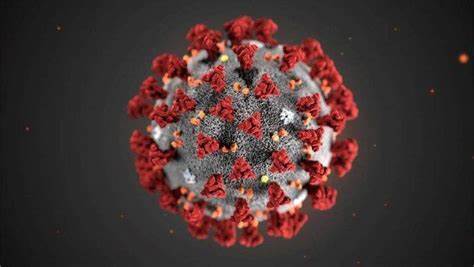
SARS-CoV-2 virus (Public domain)
Optimistic timelines regarding the pharmaceutical race to produce a drug for COVID-19 have been met with skepticism, but even doubters do not deny that a vaccine or a treatment is desperately needed.
“There can never be a complete (economic) recovery unless a working vaccine is developed and distributed,” said Chung Chul, senior vice president and acting president of the Korea Institute for International Economic Policy, in a press briefing Tuesday at the Sejong Government Complex.
Korean pharmaceutical companies expect to begin clinical trials of their COVID-19 pipelines starting from June at the earliest.
Potentially the first to enter human tests is Genexine, whose GX-19 vaccine pipeline is intended to prevent COVID-19 infection.
Celltrion and GC Pharma, who are respectively researching anti-viral and blood plasma-derived treatments for confirmed patients, are set to begin human tests in July.
In an interview with Generics Bulletin, Celltrion Healthcare’s UK Commercial Director Matt Eddleston said that Celltrion would begin clinical trials of two anti-viral treatments in June in the UK and Spain. A public relations official from the company’s Korea headquarters denied the specifics.
“It’s not in June, and we haven’t decided on the countries,” the official said.
Celltrion Healthcare is the distribution arm of biologics and chemical drugs manufacturer Celltrion.
The formal stance of Celltrion is that animal trials will be held in June, with human trials slated to begin in July. The company is currently undergoing cell line manufacturing to acquire the amount of the drug required for research and development.
Daewoong Pharmaceutical, in ties with Institut Pasteur Korea, is testing to repurpose the parasiticide niclosamide as a COVID-19 treatment. The company is carrying out animal tests of the drug and plans to submit the clinical trial design for appraisal by the Drug Ministry in July.
GC Pharma’s plasma-derived COVID-19 treatment, drawn from the blood of recovered patients, will begin human tests in July.
The Ministry of Welfare reviewed 21 firms as having made actual progress in COVID-19 drug research, for whom the government agency will provide support and ease regulations to yield expedited results.
“There is no exterior pressure. We have run an independent review of the firms that are pursuing COVID-19 treatments, through which we were able to pick out a wide range of firms that have made actual progress from their initial pitches,” Bang Yeong-sik, second in line at the Welfare Ministry’s policymaking bureau for health industry, told The Korea Herald.
The selected companies were categorized into three, based on what kind of drug they were trying to develop -- repurposed drugs, novel treatments or preventive vaccines.
In the area of pharmaceutical repurposing, ImmueMed, Pharmicell, Ilyang Pharmaceutical, Bookwang Pharmaceutical, Korea United Pharmaceutical, Cellivery and Kainos Med made the list.
Novel treatment-wise, Celltrion, Komipharm International, NovaCell Technology, Eutilex, Enzychem Lifesciences, GC Pharma and Future Medicine, were included.
On the vaccines front, GeneOne Life Science, Biopoa, LG Chem, Genexine, Sumagen, Gflas Lifesciences and SK bioscience were selected.
“Each of these companies are researching and developing various ways to curb the pandemic and they have different problems with which the government can provide help,” Bang said.
For instance, not all the companies have biosafety level 3 or good manufacturing practice-certified drug production facilities. The ministry can open access to state-owned facilities where such companies can manufacture cell lines.
In the case of plasma treatment pursuits, while current regulations state that recovered patients’ blood can only be procured via hospitals, rules will be modified to allow the Korean Red Cross to also collect blood samples.
“The current list of companies for governmental support is not definitive. We will continue to review companies and provide solutions that will facilitate their research for COVID-19 drugs,” Bang said.
Globally, there were about 4.1 million confirmed cases of COVID-19, including over 283,000 deaths, according to a World Health Organization tally as of Wednesday.
Europe and the Americas had the worst numbers, each accounting for more than 1.7 million confirmed cases.
In Korea, confirmed cases reached 10,962, of whom 9,695 were discharged after recovery. The death toll here is 259, according to the national disease controlling center on Wednesday.
A single uncontained infection can easily blow up, however, as demonstrated in the recent case of a clubgoer here who has been linked to a cluster of over 100 confirmed cases and counting.
By Lim Jeong-yeo (
kaylalim@heraldcorp.com)






![[KH Explains] How should Korea adjust its trade defenses against Chinese EVs?](http://res.heraldm.com/phpwas/restmb_idxmake.php?idx=645&simg=/content/image/2024/04/15/20240415050562_0.jpg&u=20240415144419)